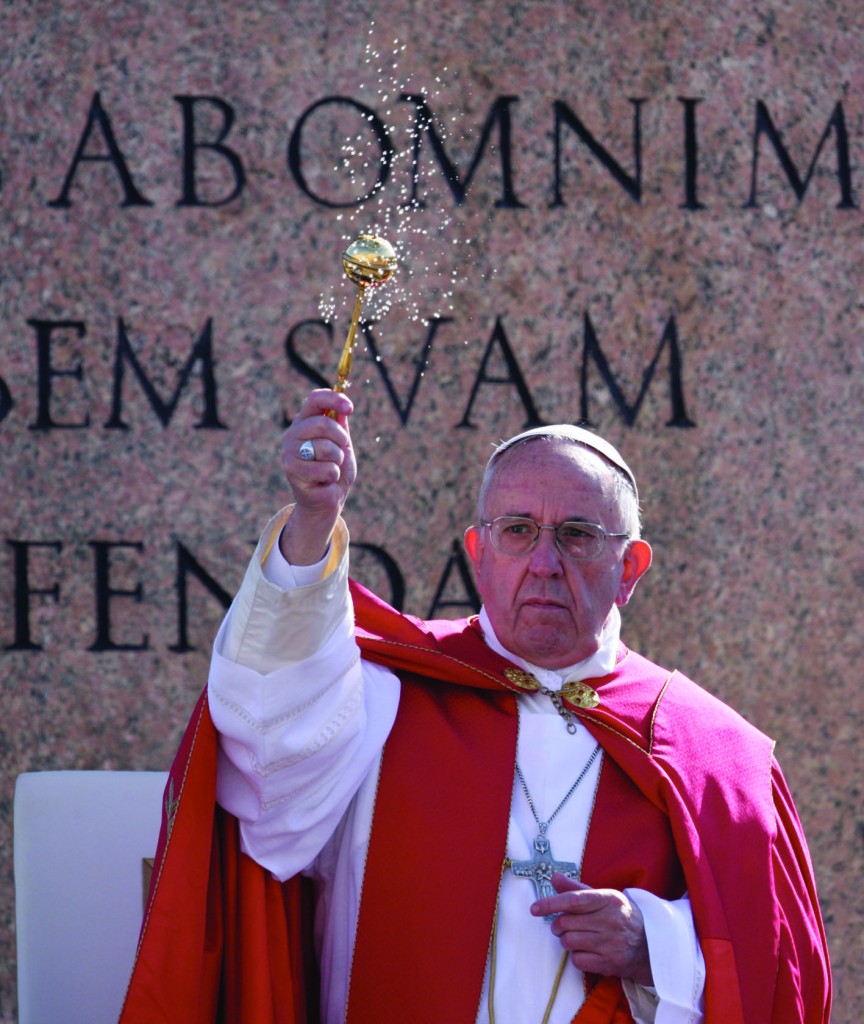
At the end of the Palm procession in St. Peter’s Square, Pope Francis blesses palms and olive branches in front of the Obelisk (photo Grzegorz Galazka)
The Liturgical Celebrations of Holy Week Unfolded with No Violent Incidents Despite Fears following the March 22 Terrorist Bombings in Brussels
Pope Francis in his Palm Sunday 2016 homily lamented what he termed a lack of concern for the many Middle Eastern and African refugees flooding into Europe, making a comparison to the Roman authorities who washed their hands of Jesus’ fate before his crucifixion 2,000 years ago.
Before celebrating an outdoor Mass, Francis led a procession through St. Peter’s Square to usher in Holy Week, the period leading to Easter. Catholics holding olive branches and braided palm fronds received his blessing.
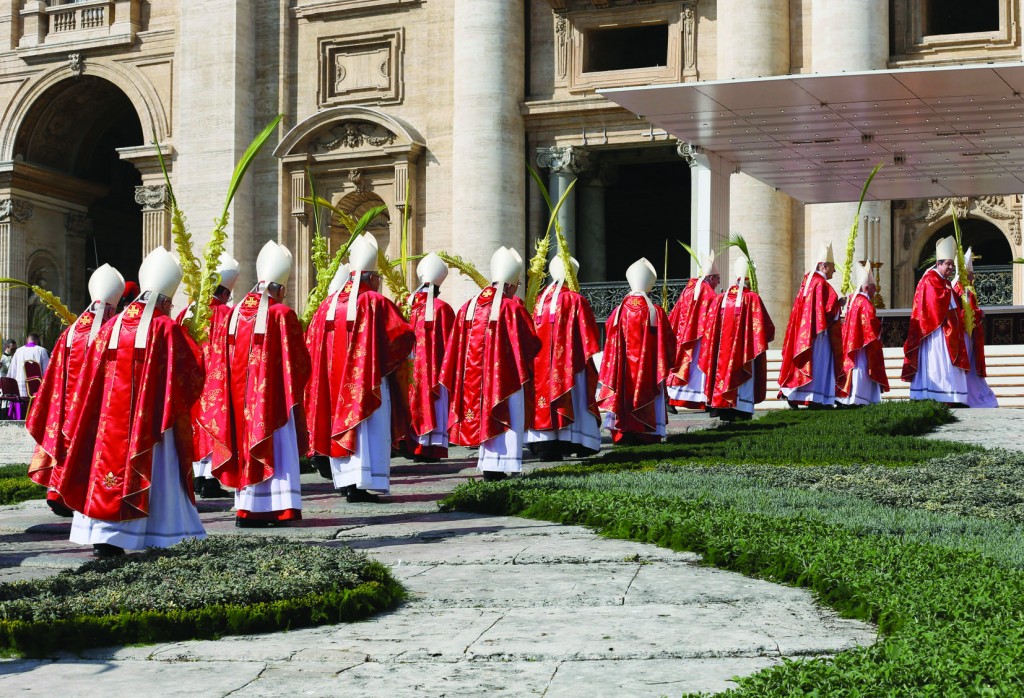
Palm procession from the Parvis of St. Peter’s Basilica to the Obelisk presided by Pope Francis accompanied by concelebrant Cardinals (photo Grzegorz Galazka)
Francis abandoned his homily text to denounce Europe’s half-hearted reception of the influx of migrants and asylum-seekers fleeing war, persecution or poverty from Syria, Iraq, Libya, Somalia, and elsewhere.
Palm Sunday recalls a crowd’s welcome of Jesus entering Jerusalem. But soon Jesus would be condemned to be crucified after a series of authorities declined to rule on his fate.
Francis drew a parallel to that with some European countries’ refusal to take responsibility for some of the more than 1 million refugees who reached Europe last year after risky sea voyages arranged by smugglers.
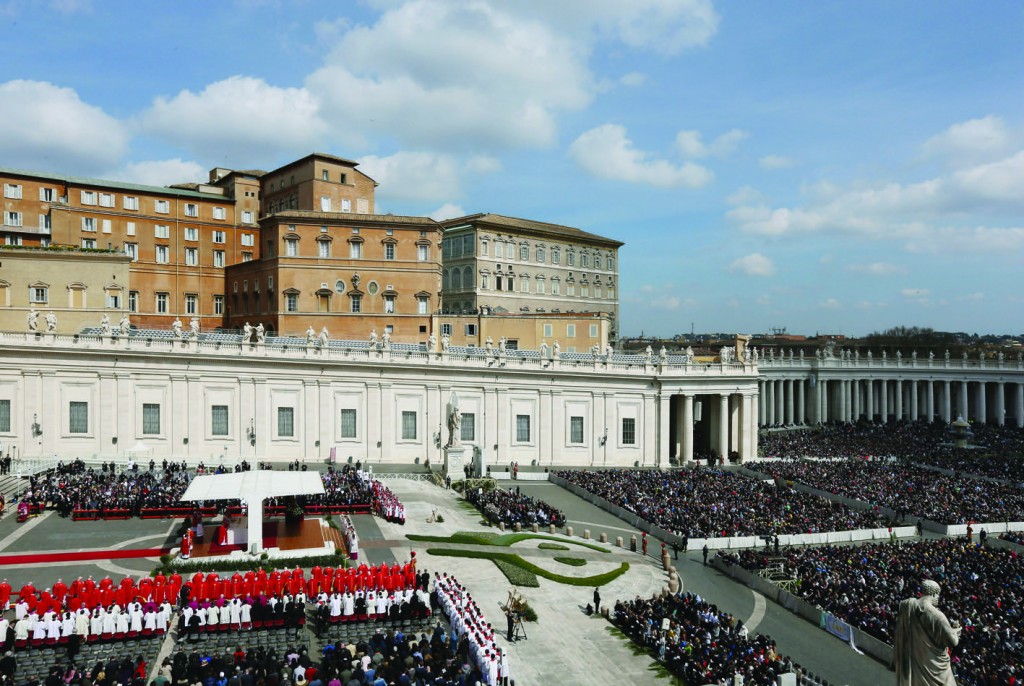
Holy Mass celebrated by Pope Francis (photo Grzegorz Galazka)
Jesus was “denied every justice,” the Pope said. “Jesus suffered in his own skin indifference, because no one wanted to take on the responsibility for his destiny.”
“And I am thinking of so many people, so many on the margins, so many refugees” for whom “many don’t want to assume responsibility for their destiny,” Francis said in a clear reference to Europe’s migration debate.
After the Mass, Francis joyfully greeted tens of thousands of people as he toured the square in his white popemobile, and let some children aboard for a while.
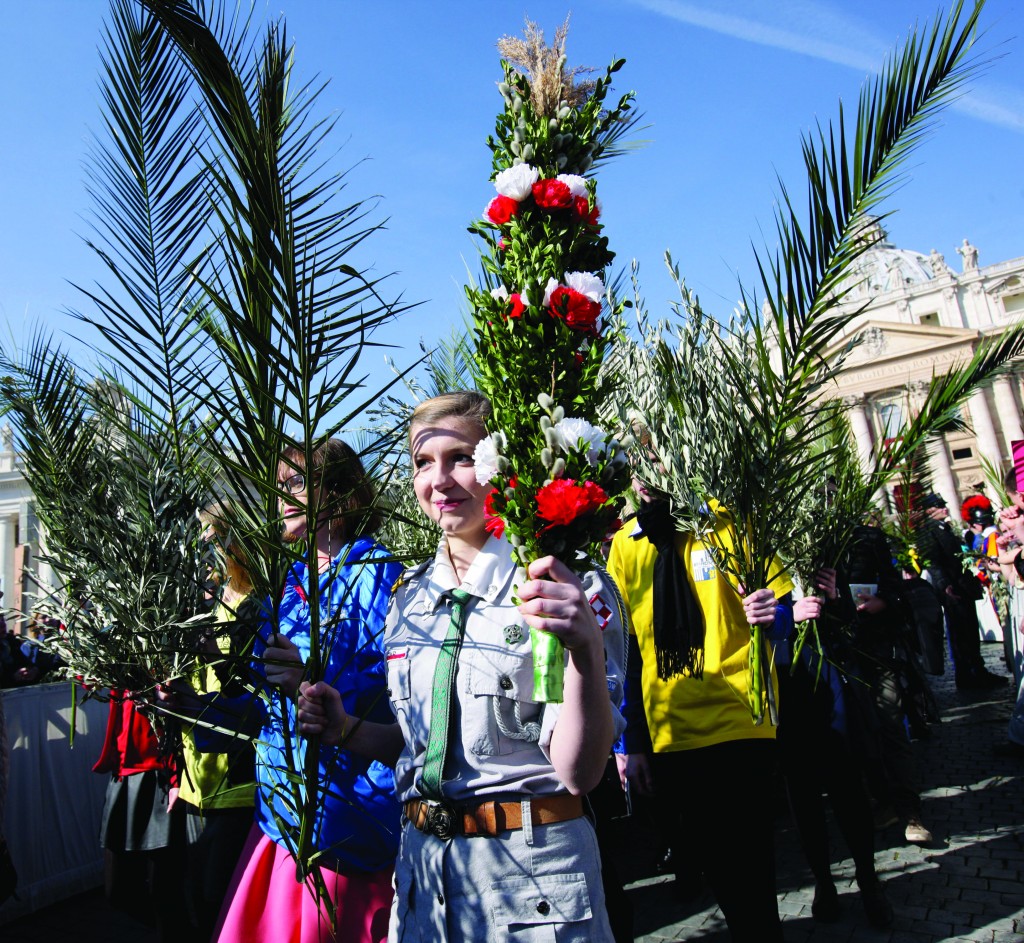
Palm procession with a group of faithful people (Photo Grzegorz Galazka)
“The Mercy of Our God Is Infinite”
Homily of Pope Francis for the Chrism Mass – March 24, 2016
After hearing Jesus read from the Prophet Isaiah and say: “Today this Scripture has been fulfilled in your hearing” (Luke 4:21), the congregation in the synagogue of Nazareth might well have burst into applause. They might have then wept for joy, as did the people when Nehemiah and Ezra the priest read from the book of the Law found while they were rebuilding the walls. But the Gospels tell us that Jesus’ townspeople did the opposite; they closed their hearts to him and sent him off. At first, “all spoke well of him, and wondered at the gracious words that came from his mouth” (4:22). But then an insidious question began to make the rounds: “Is this not the son of Joseph, the carpenter?” (4:22). And then, “they were filled with rage” (4:28). They wanted to throw him off the cliff. This was in fulfilment of the elderly Simeon’s prophecy to the Virgin Mary that he would be “a sign of contradiction” (2:34). By his words and actions, Jesus lays bare the secrets of the heart of every man and woman.
Where the Lord proclaims the Gospel of the Father’s unconditional mercy to the poor, the outcast and the oppressed, is the very place we are called to take a stand, to “fight the good fight of the faith” (1 Tim 6:12). His battle is not against men and women, but against the devil (cf. Eph 6:12), the enemy of humanity. But the Lord “passes through the midst” of all those who would stop him and “continues on his way” (Lk 4:30). Jesus does not fight to build power. If he breaks down walls and challenges our sense of security, he does this to open the floodgates of that mercy which, with the Father and the Holy Spirit, he wants to pour out upon our world. A mercy which expands; it proclaims and brings newness; it heals, liberates and proclaims the year of the Lord’s favor.
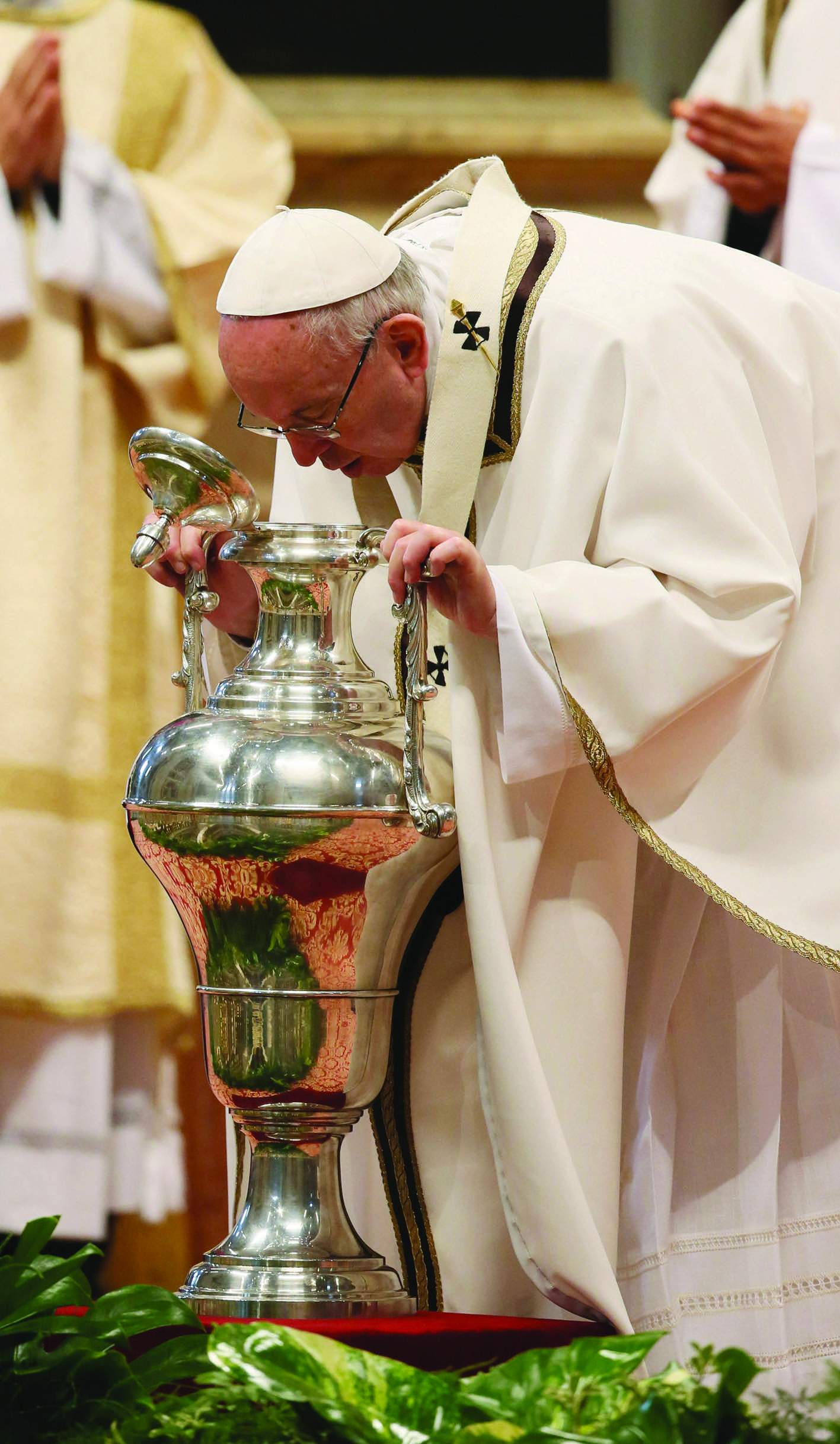
Pope Francis celebrates the Holy Thursday chrism Mass in St. Peter’s Basilica at the Vatican March 24
The mercy of our God is infinite and indescribable. We express the power of this mystery as an “ever greater” mercy, a mercy in motion, a mercy that each day seeks to make progress, taking small steps forward and advancing in that wasteland where indifference and violence have predominated.
This was the way of the Good Samaritan, who “showed mercy” (cf. Lk 10:37): he was moved, he drew near to the unconscious man, he bandaged his wounds, took him to the inn, stayed there that evening and promised to return and cover any further cost. This is the way of mercy, which gathers together small gestures. Without demeaning, it grows with each helpful sign and act of love. Every one of us, looking at our own lives as God does, can try to remember the ways in which the Lord has been merciful towards us, how he has been much more merciful than we imagined. In this we can find the courage to ask him to take a step further and to reveal yet more of his mercy in the future: “Show us, Lord, your mercy” (Ps 85:8). This paradoxical way of praying to an ever more merciful God, helps us to tear down those walls with which we try to contain the abundant greatness of his heart. It is good for us to break out of our set ways, because it is proper to the Heart of God to overflow with tenderness, with ever more to give. For the Lord prefers something to be wasted rather than one drop of mercy be held back. He would rather have many seeds be carried off by the birds of the air than have one seed be missing, since each of those seeds has the capacity to bear abundant fruit, thirtyfold, sixtyfold, even a hundredfold.
As priests, we are witnesses to and ministers of the ever-increasing abundance of the Father’s mercy; we have the rewarding and consoling task of incarnating mercy, as Jesus did, who “went about doing good and healing” (Acts 10:38) in a thousand ways so that it could touch everyone. We can help to inculturate mercy, so that each person can embrace it and experience it personally. This will help all people truly understand and practice mercy with creativity, in ways that respect their local cultures and families.
Today, during this Holy Thursday of the Jubilee Year of Mercy, I would like to speak of two areas in which the Lord shows excess in mercy. Based on his example, we also should not hesitate in showing excess. The first area I am referring to is encounter; the second is God’s forgiveness, which shames us while also giving us dignity.
The first area where we see God showing excess in his ever-increasing mercy is that of encounter. He gives himself completely and in such a way that every encounter leads to rejoicing. In the parable of the Merciful Father we are astounded by the man who runs, deeply moved, to his son, and throws his arms around him; we see how he embraces his son, kisses him, puts a ring on his finger, and then gives him his sandals, thus showing that he is a son and not a servant. Finally, he gives orders to everyone and organizes a party. In contemplating with awe this superabundance of the Father’s joy that is freely and boundlessly expressed when his son returns, we should not be fearful of exaggerating our gratitude. Our attitude should be that of the poor leper who, seeing himself healed, leaves his nine friends who go off to do what Jesus ordered, and goes back to kneel at the feet of the Lord, glorifying and thanking God aloud.
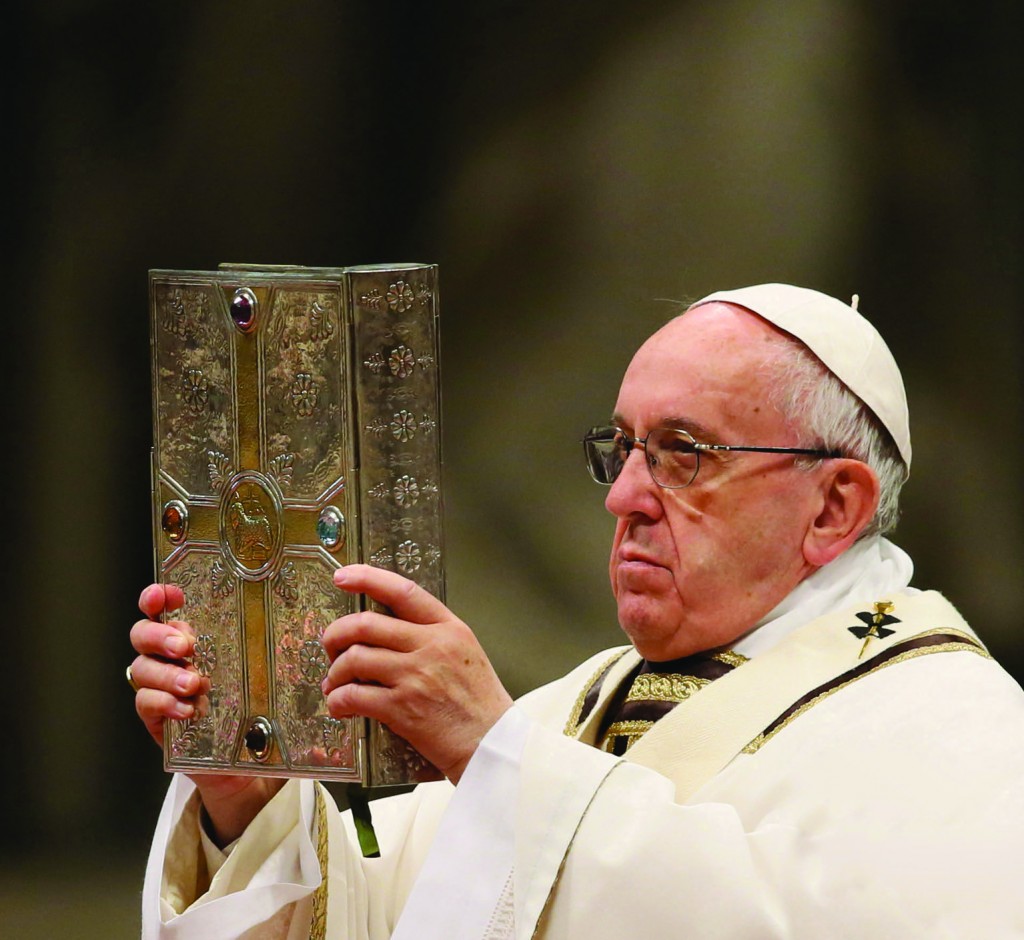
Chrism Mass Holy Thursday
Mercy restores everything; it restores dignity to each person. This is why effusive gratitude is the proper response: we have to go the party, to put on our best clothes, to cast off the rancor of the elder brother, to rejoice and give thanks… Only in this way, participating fully in such rejoicing, is it possible to think straight, to ask for forgiveness, and see more clearly how to make up for the evil we have committed. It would be good for us to ask ourselves: after going to confession, do I rejoice? Or do I move on immediately to the next thing, as we would after going to the doctor, when we hear that the test results are not so bad and put them back in their envelope? And when I give alms, do I give time to the person who receives them to express their gratitude, do I celebrate the smile and the blessings that the poor offer, or do I continue on in haste with my own affairs after tossing in a coin?
The second area in which we see how God exceeds in his ever greater mercy is forgiveness itself. God does not only forgive incalculable debts, as he does to that servant who begs for mercy but is then miserly to his own debtor; he also enables us to move directly from the most shameful disgrace to the highest dignity without any intermediary stages. The Lord allows the forgiven woman to wash his feet with her tears. As soon as Simon confesses his sin and begs Jesus to send him away, the Lord raises him to be a fisher of men. We, however, tend to separate these two attitudes: when we are ashamed of our sins, we hide ourselves and walk around with our heads down, like Adam and Eve; and when we are raised up to some dignity, we try to cover up our sins and take pleasure in being seen, almost showing off.
Our response to God’s superabundant forgiveness should be always to preserve that healthy tension between a dignified shame and a shamed dignity. It is the attitude of one who seeks a humble and lowly place, but who can also allow the Lord to raise him up for the good of the mission, without complacency. The model that the Gospel consecrates, and which can help us when we confess our sins, is Peter, who allowed himself to be questioned about his love for the Lord, but who also renewed his acceptance of the ministry of shepherding the flock which the Lord had entrusted to him.
To grow in this “dignity which is capable of humbling itself,” and which delivers us from thinking that we are more or are less than what we are by grace, can help us understand the words of the prophet Isaiah that immediately follow the passage our Lord read in the synagogue at Nazareth: “You will be called priests of the Lord, ministers of our God” (Is 61:6). It is people who are poor, hungry, prisoners of war, without a future, cast to one side and rejected, that the Lord transforms into a priestly people.
As priests, we identify with people who are excluded, people the Lord saves. We remind ourselves that there are countless masses of people who are poor, uneducated, prisoners, who find themselves in such situations because others oppress them. But we too remember that each of us knows the extent to which we too are often blind, lacking the radiant light of faith, not because we do not have the Gospel close at hand, but because of an excess of complicated theology. We feel that our soul thirsts for spirituality, not for a lack of Living Water which we only sip from, but because of an excessive “bubbly” spirituality, a “light” spirituality. We feel ourselves also trapped, not so much by insurmountable stone walls or steel enclosures that affect many peoples, but rather by a digital, virtual worldliness that is opened and closed by a simple click. We are oppressed, not by threats and pressures, like so many poor people, but by the allure of a thousand commercial advertisements which we cannot shrug off to walk ahead, freely, along paths that lead us to love of our brothers and sisters, to the Lord’s flock, to the sheep who wait for the voice of their shepherds.
Jesus comes to redeem us, to send us out, to transform us from being poor and blind, imprisoned and oppressed, to become ministers of mercy and consolation. He says to us, using the words the prophet Ezekiel spoke to the people who sold themselves and betrayed the Lord: “I will remember my covenant with you in the days of your youth… Then you will remember your ways, and be ashamed when I take your sisters, both your elder and your younger, and give them to you as daughters, but not on account of the covenant with you. I will establish my covenant with you, and you shall know that I am the Lord, that you may remember and be confounded, and never open your mouth again because of your shame, when I forgive you all that you have done, says the Lord God” (Ezek 16:60-63).
In this Jubilee Year we celebrate our Father with hearts full of gratitude, and we pray to him that “he remember his mercy forever”; let us receive, with a dignity that is able to humble itself, the mercy revealed in the wounded flesh of our Lord Jesus Christ. Let us ask him to cleanse us of all sin and free us from every evil. And with the grace of the Holy Spirit let us commit ourselves anew to bringing God’s mercy to all men and women, and performing those works which the Spirit inspires in each of us for the common good of the entire People of God.
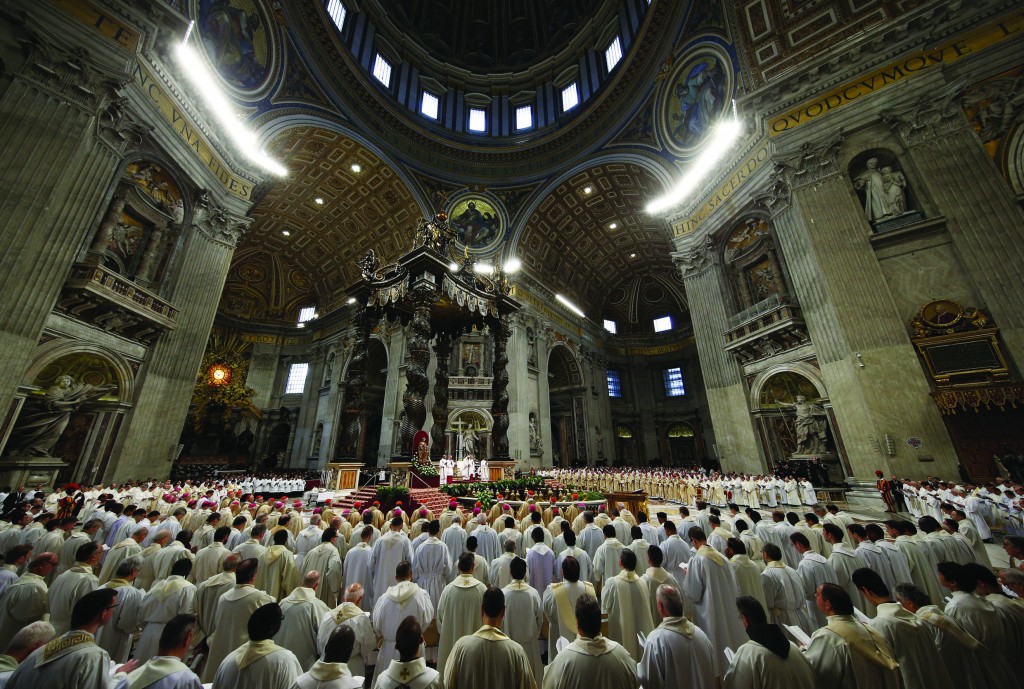
Pope Francis celebrates the Holy Thursday Chrism Mass in St. Peter’s Basilica at the Vatican March 24 (CNS photo/Paul Haring)
Missa in Coena Domini at Refugee Center in Rome
Pope Francis celebrated the Missa in Coena Domini — the Mass of the Lord’s Supper — on Holy Thursday, leading the Church of Rome into the sacred Paschal Triduum that culminates in the great Easter Vigil in the night between Holy Saturday and Resurrection Sunday. This year, the Holy Father celebrated the Lord’s Supper at a temporary welcome and living facility for refugees and asylum-seekers located on the outskirts of Rome.
At present, the C.A.R.A. Centre — as it is styled in Italian — is host to nearly 900 asylum-seekers from 25 different countries spread across Africa, Asia, and even Europe.
The Auxilium cooperative is present at the Centre, as well, performing educational, cultural and legal services for the C.A.R.A. guests. Auxilium was founded by an energetic group of university students from Italy’s Basilicata region in 1999, and has grown into a nationwide service organization with international partners.
Service was a major theme of the Holy Thursday liturgy: Pope Francis, in imitation of Christ at the Last Supper, performed the ritual washing of the feet of a dozen people — 11 guests of the C.A.R.A. Centre and one woman who works at the Centre for Auxilium. Four of the guests taking part in the ritual were Nigerian Catholics, three others — all three women — were Coptic Christians from Eritrea, three others were Muslims from Syria, Pakistan and Mali, and one was an Indian Hindu.
The majority of the guests at the facility are Muslim, and there are some Protestants and Coptic Christians as well — though the Auxilium group that operates the Centre since 2014 informs that there has never been any tension as a result of the religious diversity of the guests, and that among all the guests and Auxilium staff there was enormous enthusiasm for the papal visit.
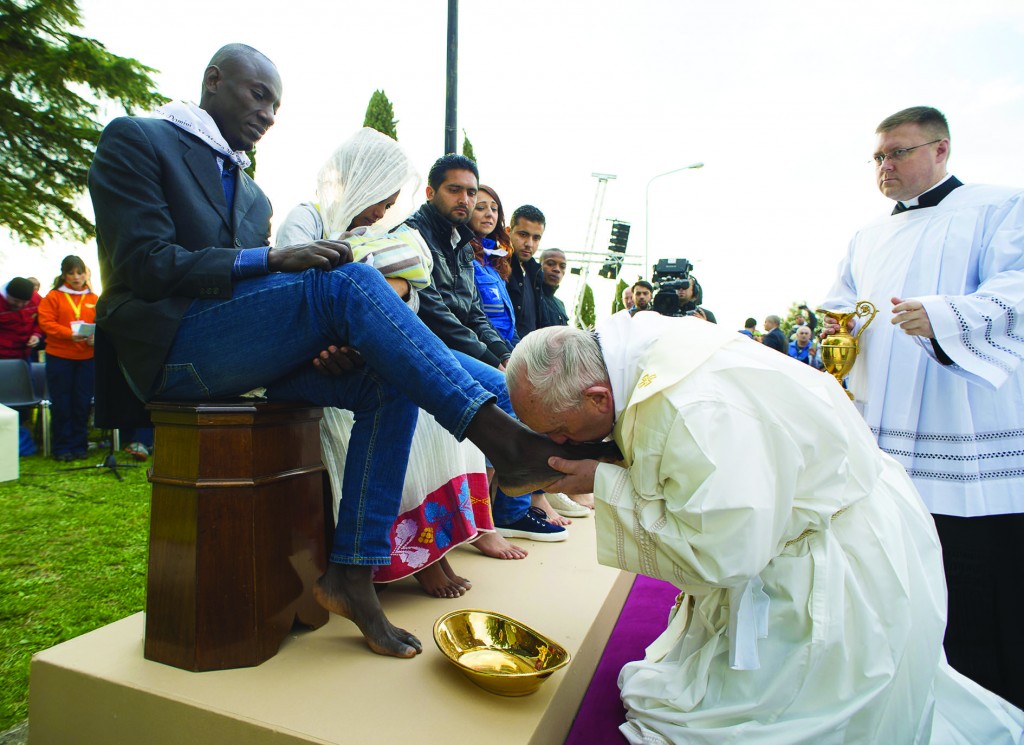
Pope Francis kisses the foot of a refugee during Holy Thursday Mass of the Lord’s Supper at the Center for Asylum Seekers in Castelnuovo di Porto, about 15 miles north of Rome March 24. The pope washed and kissed the feet of refugees, including Muslims, Hindus and Copts. (CNS photo/L’Osservatore Romano, handout)
“You, We, All Together…”
Pope Francis’ Homily for the Mass of the Lord’s Supper – March 24, 2016
The gestures speak louder than pictures and words. The gestures… There are, in the Word of God that we read, two gestures: Jesus serving, washing the feet… He, who was the “head,” washing the feet of others, they were his own, even the smallest of them all. A gesture. The second gesture: Judas who goes with the enemies of Jesus, to those who do not want peace with Jesus, to take the money with which they betrayed him, the 30 pieces of silver. Two gestures. Even today, here, there are two gestures: the first — all of us together: Muslims, Hindus, Catholics, Copts, Evangelicals, but all brothers and children of the same God: we want to live together in peace. One gesture. Three days ago, an act of war, of destruction in a European city, by people who do not want to live in peace.
But behind that gesture, just as behind Judas, there were others. Behind Judas there were those who gave the money so that Jesus would be handed over. Behind “that” gesture, there are manufacturers, arms dealers who want blood, not peace; they want war, not brotherhood. Two gestures, the same: Jesus washes the feet; Judas sold Jesus for money.
You, we, all together, different religions, different cultures, but children of the same Father, brothers. And there, those poor people who buy weapons to destroy brotherhood.
Today, at this moment when I will perform the same action of Jesus washing the feet of twelve of you, all of us are performing a gesture of brotherhood, and we all say: “We are different, we are different, we have different cultures and religions, but we are brothers and we want to live in peace.” And this is the gesture that I perform with you.
Each of us has a story within us. So many crosses, so many sorrows, but we also have a heart open to brotherhood. May each one of us in our own religious language, beg the Lord that this brotherhood be contagious in the world, so that there are not 30 coins to kill our brother, so that there will always be brotherhood and goodness. So be it.
(English language translation by Fr. Thomas Rosica, CSB)
Way of the Cross at the Coliseum
O Cross of Christ! O Cross of Christ, symbol of divine love and of human injustice, icon of the supreme sacrifice for love and of boundless selfishness even unto madness, instrument of death and the way of resurrection, sign of obedience and emblem of betrayal, the gallows of persecution and the banner of victory.
O Cross of Christ, today too we see you raised up in our sisters and brothers killed, burned alive, throats slit and decapitated by barbarous blades amid cowardly silence.
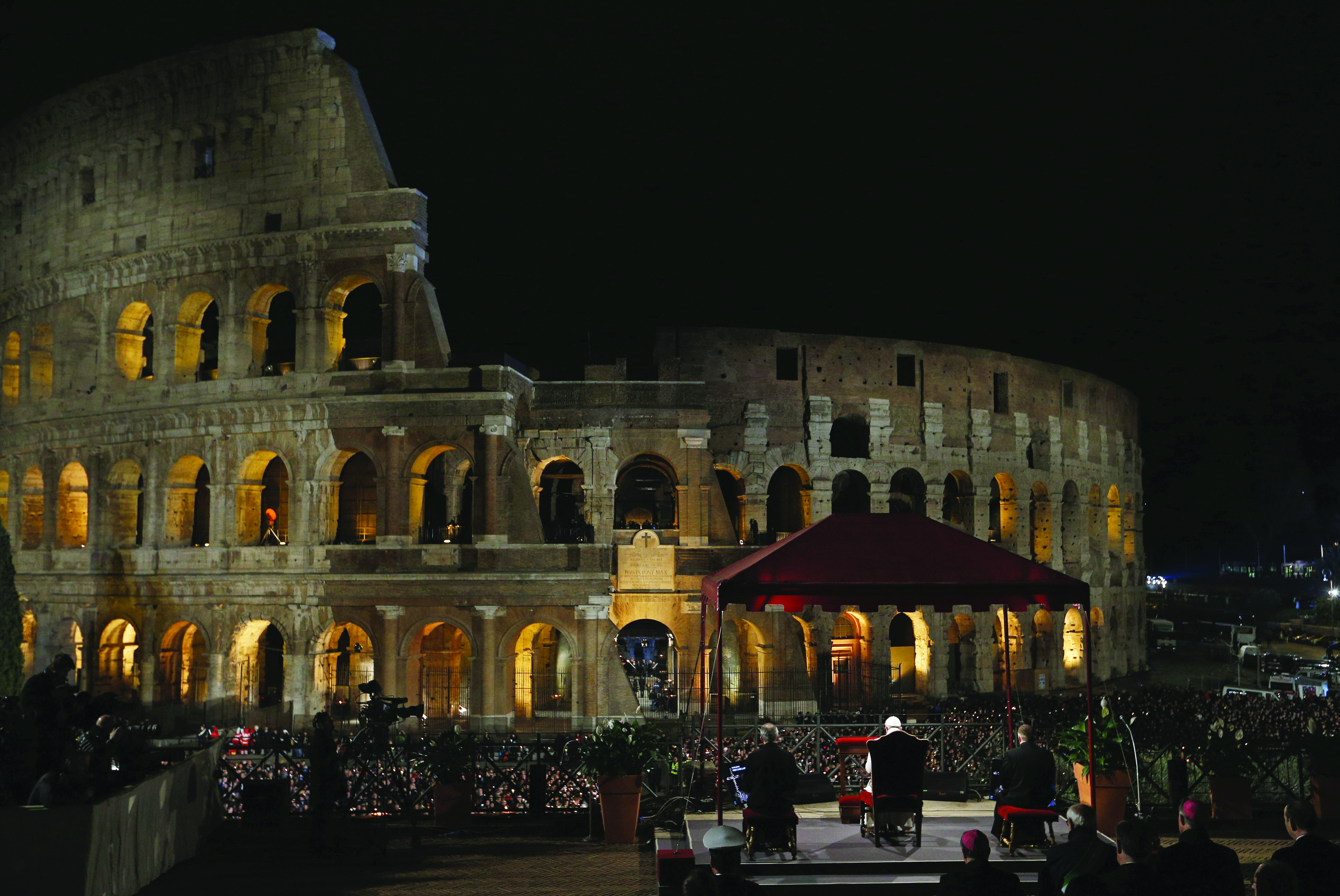
Pope Francis presides at the Way of the Cross outside the ancient Colosseum in Rome March 25 (CNS photo/Paul Haring)
O Cross of Christ, today too we see you in the faces of children, of women and people, worn out and fearful, who flee from war and violence and who often only find death and many Pilates who wash their hands.
O Cross of Christ, today too we see you in those filled with knowledge and not with the spirit, scholars of death and not of life, who instead of teaching mercy and life, threaten with punishment and death, and who condemn the just.
O Cross of Christ, today too we see you in unfaithful ministers who, instead of stripping themselves of their own vain ambitions, divest even the innocent of their dignity.
O Cross of Christ, today too we see you in the hardened hearts of those who easily judge others, with hearts ready to condemn even to the point of stoning, without ever recognizing their own sins and faults.
O Cross of Christ, today too we see you in expressions of fundamentalism and in terrorist acts committed by followers of some religions which profane the name of God and which use the holy name to justify their unprecedented violence.
O Cross of Christ, today too we see you in those who wish to remove you from public places and exclude you from public life, in the name of a pagan laicism or that equality you yourself taught us.
O Cross of Christ, today too we see you in the powerful and in arms dealers who feed the cauldron of war with the innocent blood of our brothers and sisters.
O Cross of Christ, today too we see you in traitors who, for thirty pieces of silver, would consign anyone to death.
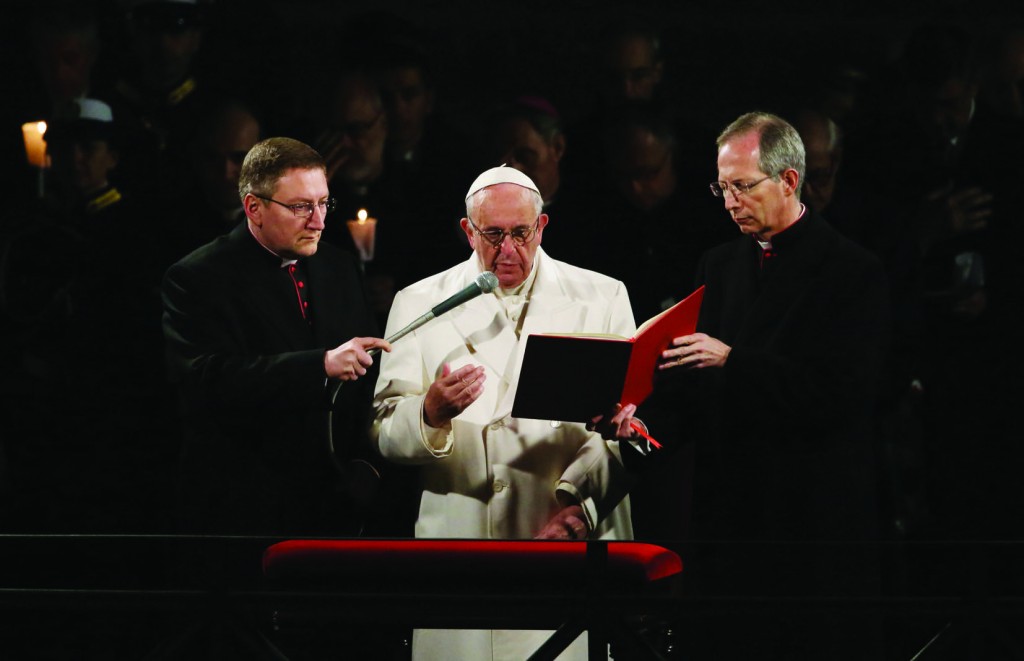
Way of the Cross at the Colosseum presided by Pope Francis (photo Grzegorz Galazka)
O Cross of Christ, today too we see you in thieves and corrupt officials who, instead of safeguarding the common good and morals, sell themselves in the despicable market-place of immorality.
O Cross of Christ, today too we see you in the foolish who build warehouses to store up treasures that perish, leaving Lazarus to die of hunger at their doorsteps.
O Cross of Christ, today too we see you in the destroyers of our “common home,” who by their selfishness ruin the future of coming generations.
O Cross of Christ, today too we see you in the elderly who have been abandoned by their families, in the disabled and in children starving and cast-off by our egotistical and hypocritical society.
O Cross of Christ, today too we see you in the Mediterranean and Aegean Seas which have become insatiable cemeteries, reflections of our indifferent and anesthetized conscience.
O Cross of Christ, image of love without end and way of the Resurrection, today too we see you in noble and upright persons who do good without seeking praise or admiration from others.
O Cross of Christ, today too we see you in ministers who are faithful and humble, who illuminate the darkness of our lives like candles that burn freely in order to brighten the lives of the least among us.
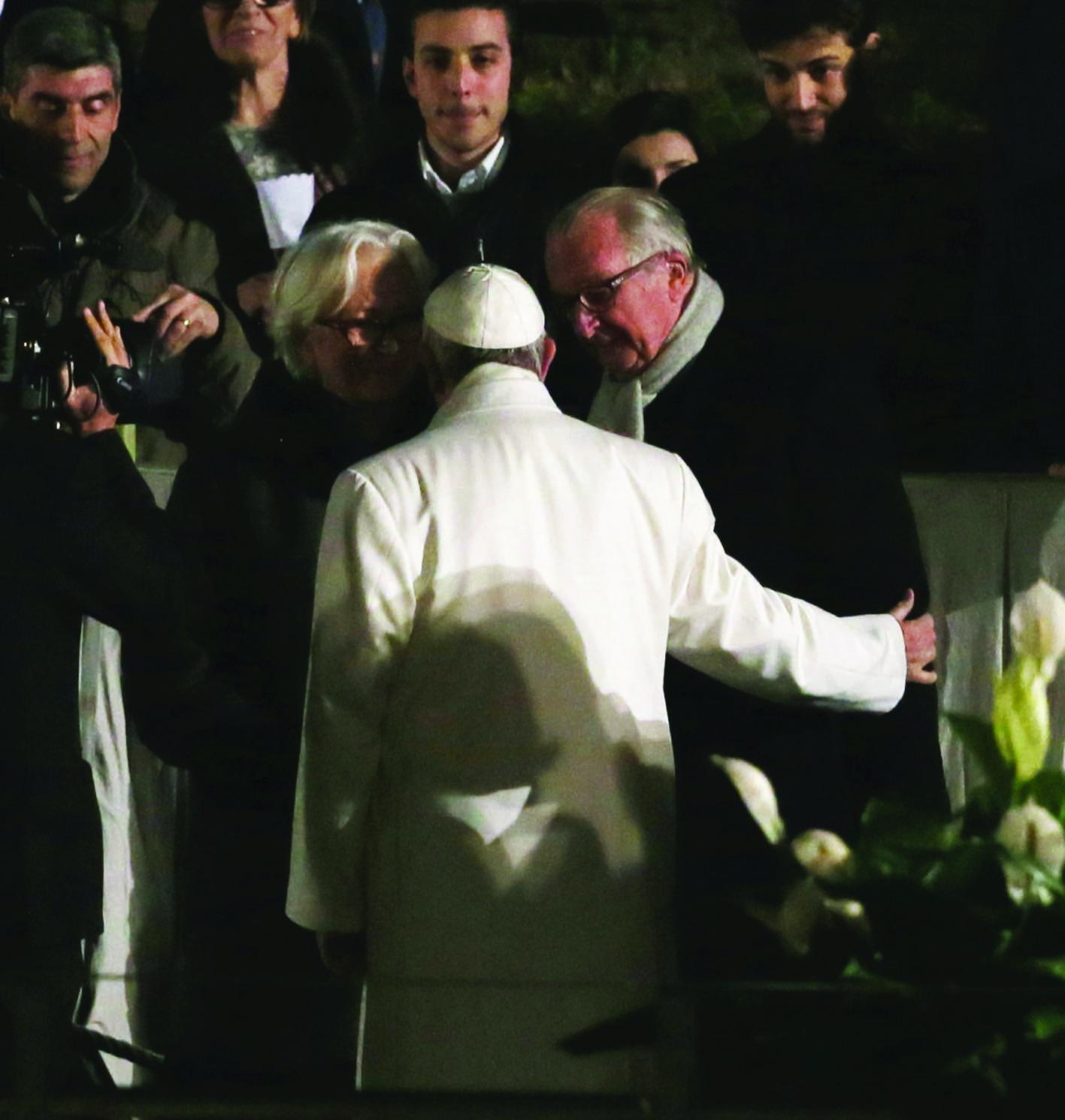
The Holy Father greets Queen Paola and King Albert II of Belgium at the end of the liturgy (photo Grzegorz Galazka)
O Cross of Christ, today too we see you in the faces of consecrated women and men – good Samaritans – who have left everything to bind up, in evangelical silence, the wounds of poverty and injustice.
O Cross of Christ, today too we see you in the merciful who have found in mercy the greatest expression of justice and faith.
O Cross of Christ, today too we see you in simple men and women who live their faith joyfully day in and day out, in filial observance of your commandments.
O Cross of Christ, today too we see you in the contrite, who in the depths of the misery of their sins, are able to cry out: Lord, remember me in your kingdom!
O Cross of Christ, today too we see you in the blessed and the saints who know how to cross the dark night of faith without ever losing trust in you and without claiming to understand your mysterious silence.
O Cross of Christ, today too we see you in families that live their vocation of married life in fidelity and fruitfulness.
O Cross of Christ, today too we see you in volunteers who generously assist those in need and the downtrodden.
O Cross of Christ, today too we see you in those persecuted for their faith who, amid their suffering, continue to offer an authentic witness to Jesus and the Gospel.
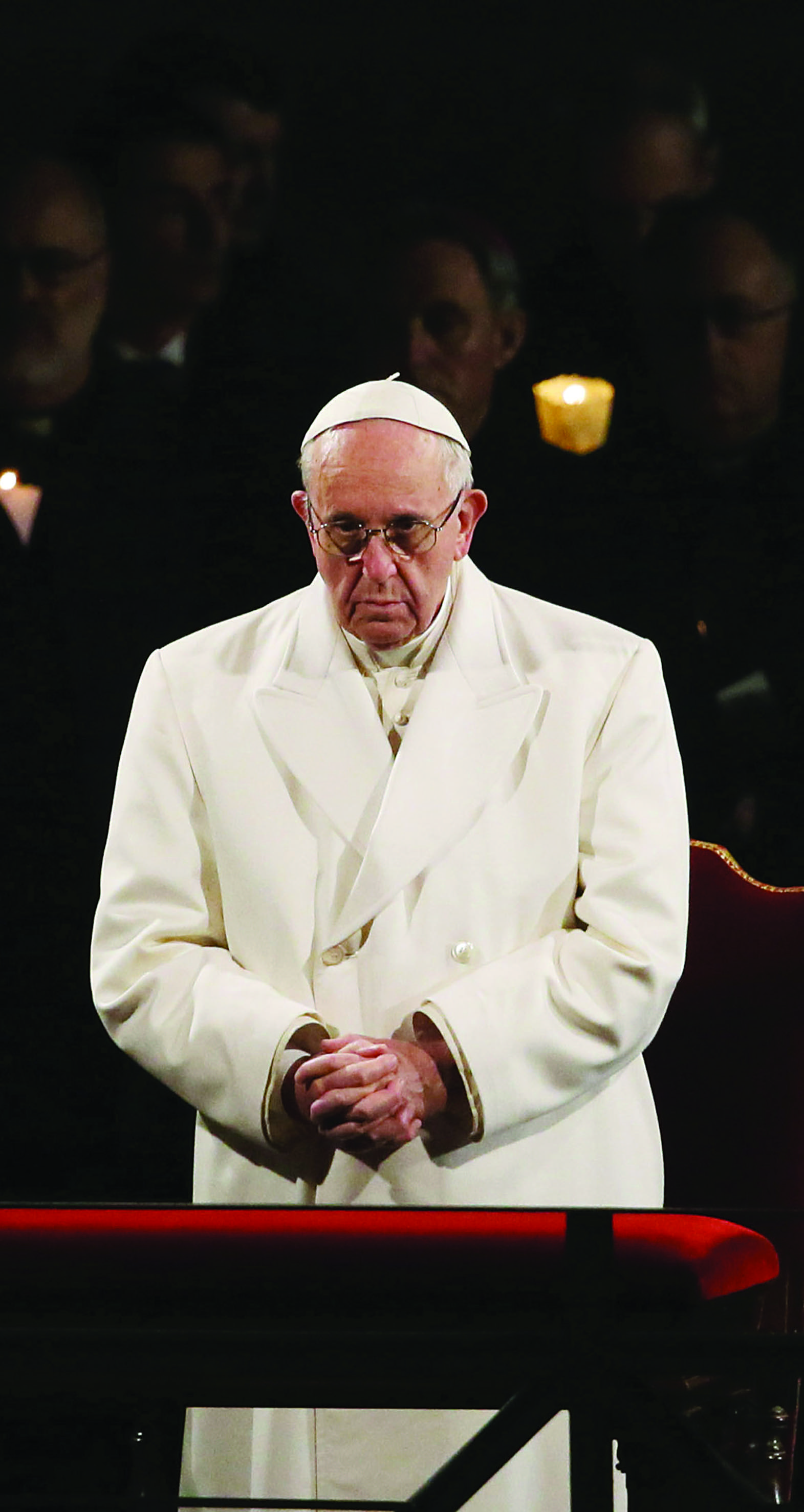
Pope Francis (photo Grzegorz Galazka)
O Cross of Christ, today too we see you in those who dream, those with the heart of a child, who work to make the world a better place, ever more human and just. In you, Holy Cross, we see God who loves even to the end, and we see the hatred of those who want to dominate, that hatred which blinds the minds and hearts of those who prefer darkness to light.
O Cross of Christ, Ark of Noah that saved humanity from the flood of sin, save us from evil and from the Evil One. O Throne of David and seal of the divine and eternal Covenant, awaken us from the seduction of vanity! O cry of love, inspire in us a desire for God, for goodness and for light.
O Cross of Christ, teach us that the rising of the sun is more powerful than the darkness of night.
O Cross of Christ, teach us that the apparent victory of evil vanishes before the empty tomb and before the certainty of the Resurrection and the love of God which nothing can defeat, obscure or weaken. Amen!
“Peter Ran to the Tomb” (Lk 24:12)
What thoughts crossed Peter’s mind and stirred his heart as he ran to the tomb? The Gospel tells us that the eleven, including Peter, had not believed the testimony of the women, their Easter proclamation. Quite the contrary, “these words seemed to them an idle tale” (v. 11). Thus there was doubt in Peter’s heart, together with many other worries: sadness at the death of the beloved Master and disillusionment for having denied him three times during his Passion.
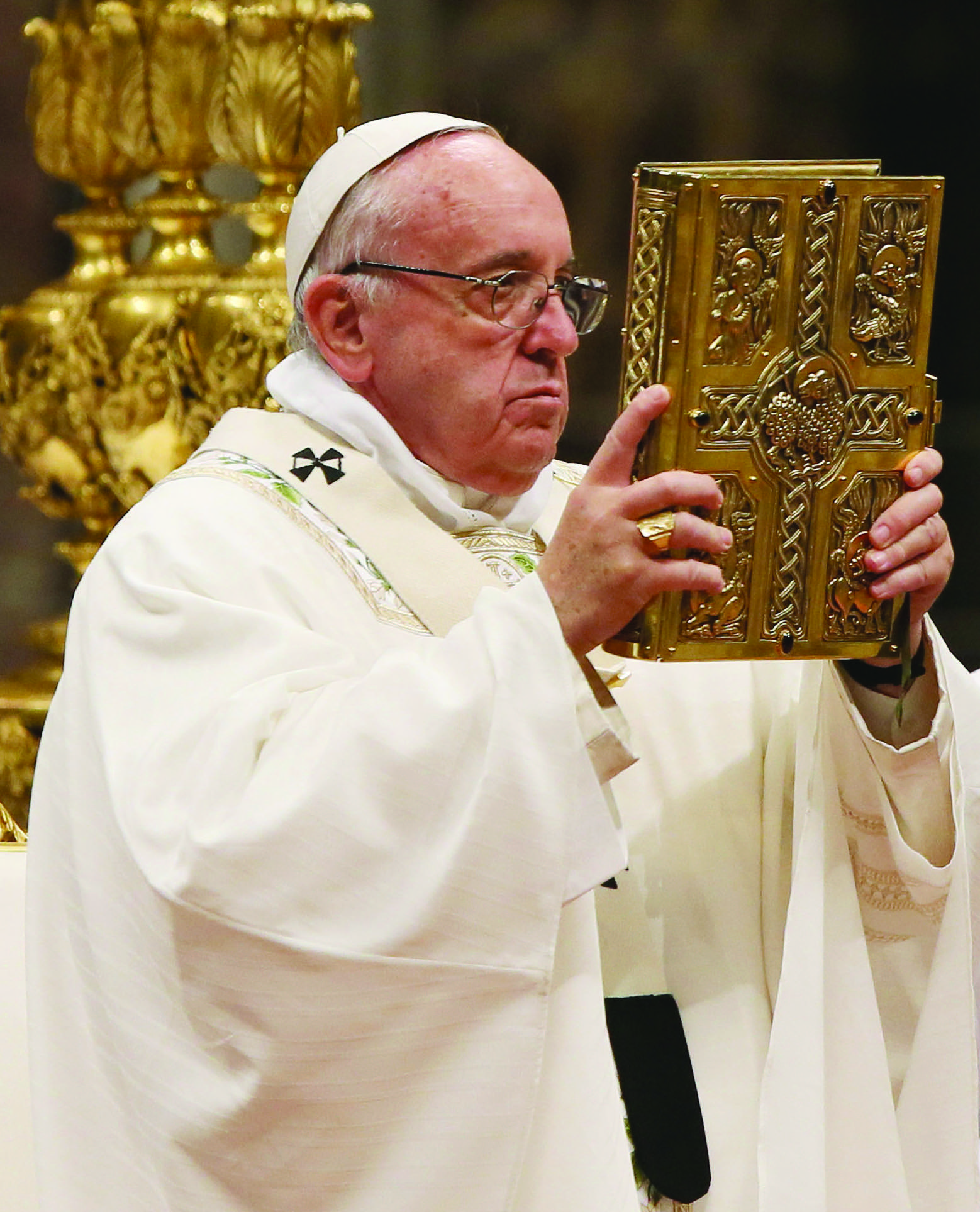
Easter Vigil in the Holy Night and Holy Mass celebrated by Pope Francis (photo Grzegorz Galazka)
There is, however, something which signals a change in him: after listening to the women and refusing to believe them, “Peter rose” (v. 12). He did not remain sedentary, in thought; he did not stay at home as the others did. He did not succumb to the somber atmosphere of those days, nor was he overwhelmed by his doubts. He was not consumed by remorse, fear or the continuous gossip that leads nowhere. He was looking for Jesus, not himself. He preferred the path of encounter and trust. And so, he got up, just as he was, and ran towards the tomb from where he would return “amazed” (v. 12). This marked the beginning of Peter’s resurrection, the resurrection of his heart. Without giving in to sadness or darkness, he made room for hope: he allowed the light of God to enter his heart without smothering it.
The women too, who had gone out early in the morning to perform a work of mercy, taking the perfumed ointments to the tomb, had the same experience. They were “frightened and bowed their faces,” and yet they were deeply affected by the words of the angel: “Why do you seek the living among the dead?” (v. 5).
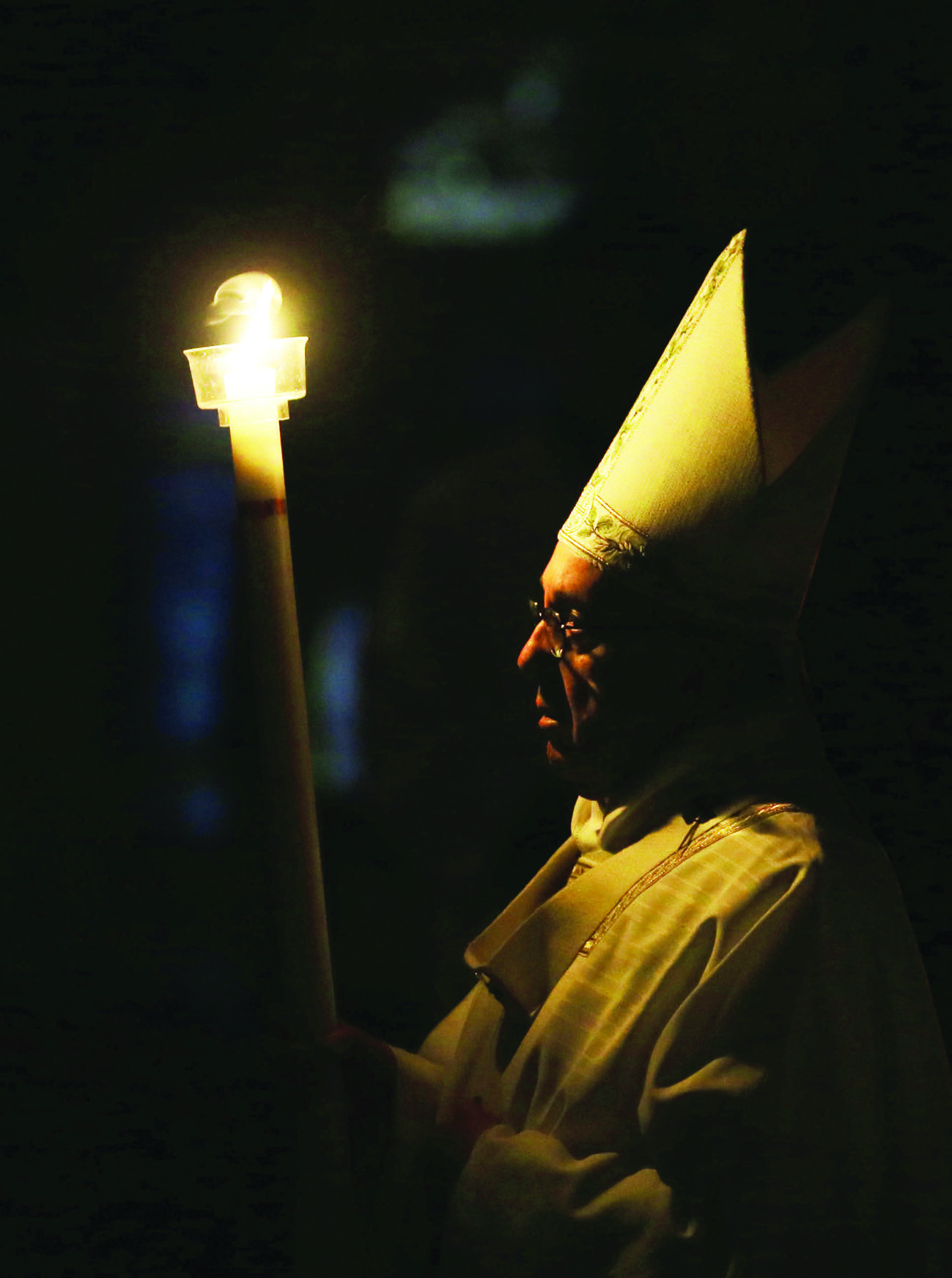
Easter Vigil in the Holy Night presided by Pope Francis. Procession to the altar with the Paschal Candle (photo Grzegorz Galazka)
We, like Peter and the women, cannot discover life by being sad, bereft of hope. Let us not stay imprisoned within ourselves, but let us break open our sealed tombs to the Lord so that he may enter and grant us life. Let us give him the stones of our rancor and the boulders of our past, those heavy burdens of our weaknesses and falls. Christ wants to come and take us by the hand to bring us out of our anguish. This is the first stone to be moved aside this night: the lack of hope which imprisons us within ourselves. May the Lord free us from this trap, from being Christians without hope, who live as if the Lord were not risen, as if our problems were the center of our lives. We see and will continue to see problems both within and without. They will always be there. But tonight it is important to shed the light of the Risen Lord upon our problems, and in a certain sense, to “evangelize” them. Let us not allow darkness and fear to distract us and control us; we must cry out to them: the Lord “is not here, but has risen!” (v. 6). He is our greatest joy; he is always at our side and will never let us down.
This is the foundation of our hope, which is not mere optimism, nor a psychological attitude or desire to be courageous. Christian hope is a gift that God gives us if we come out of ourselves and open our hearts to him. This hope does not disappoint us because the Holy Spirit has been poured into our hearts (cf. Rom 5:5). The Paraclete does not make everything look appealing. He does not remove evil with a magic wand. But he pours into us the vitality of life, which is not the absence of problems, but the certainty of being loved and always forgiven by Christ, who for us has conquered sin, death and fear. Today is the celebration of our hope, the celebration of this truth: nothing and no one will ever be able to separate us from his love (cf. Rom 8:39).
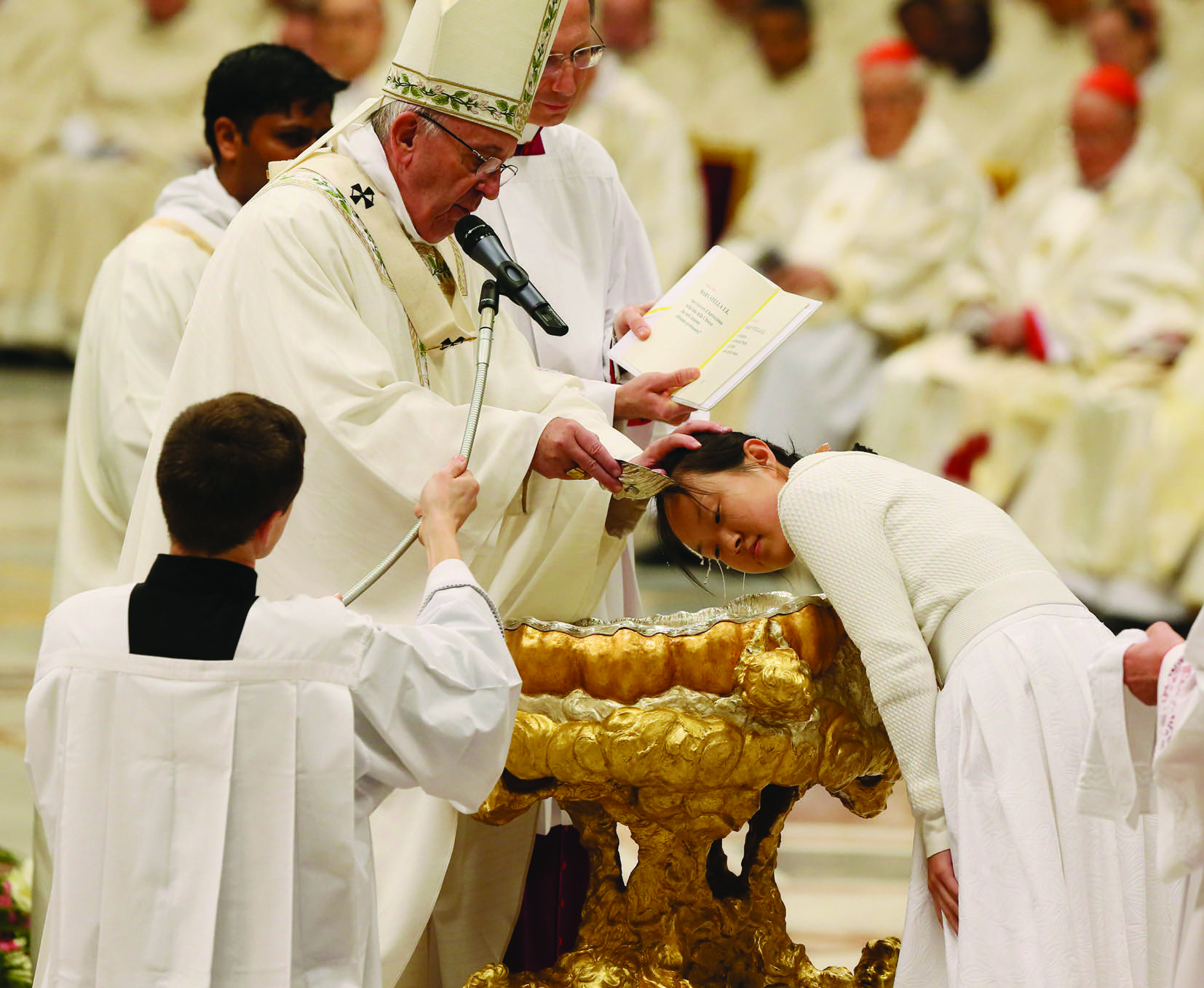
The Holy Father imparts the sacrament of baptism to the neophytes. Mary Stella Li Zhang, Cina (photo Grzegorz Galazka)
The Lord is alive and wants to be sought among the living. After having found him, each person is sent out by him to announce the Easter message, to awaken and resurrect hope in hearts burdened by sadness, in those who struggle to find meaning in life. This is so necessary today. However, we must not proclaim ourselves. Rather, as joyful servants of hope, we must announce the Risen One by our lives and by our love; otherwise we will be only an international organization full of followers and good rules, yet incapable of offering the hope for which the world longs. How can we strengthen our hope? The liturgy of this night offers some guidance. It teaches us to remember the works of God. The readings describe God’s faithfulness, the history of his love towards us. The living word of God is able to involve us in this history of love, nourishing our hope and renewing our joy. The Gospel also reminds us of this: in order to kindle hope in the hearts of the women, the angel tells them: “Remember what [Jesus] told you” (v. 6). Let us not forget his words and his works, otherwise we will lose hope. Let us instead remember the Lord, his goodness and his life-giving words which have touched us. Let us remember them and make them ours, to be sentinels of the morning who know how to help others see the signs of the Risen Lord. Dear brothers and sisters, Christ is risen! Let us open our hearts to hope and go forth. May the memory of his works and his words be the bright star which directs our steps in the ways of faith towards the Easter that will have no end.
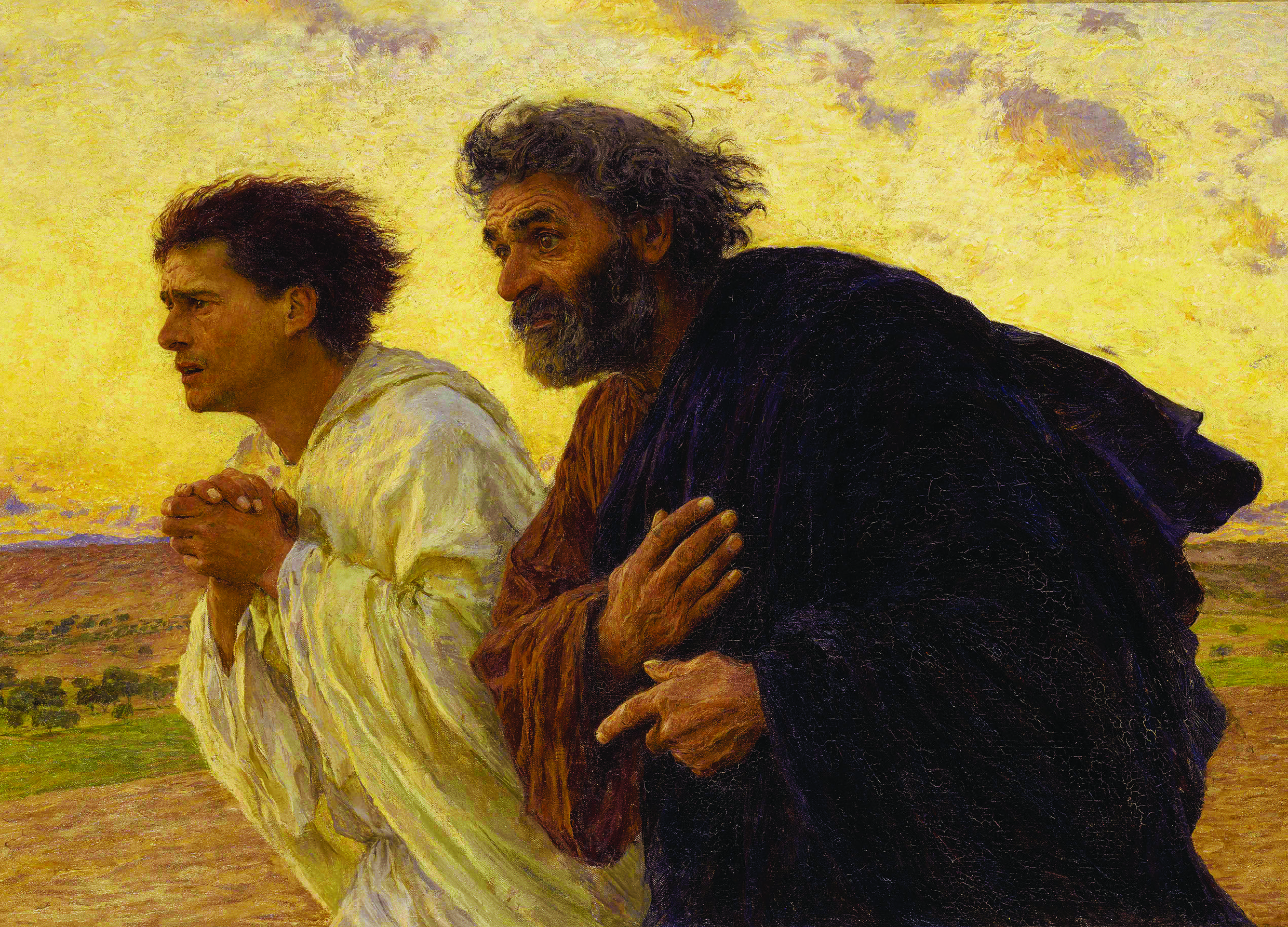
“Peter and John Running to the Tomb,” by Eugène Burnard

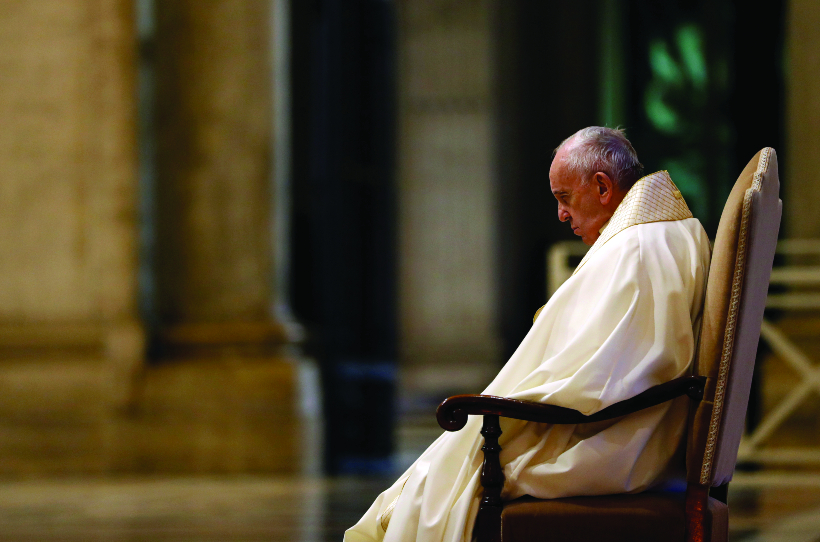
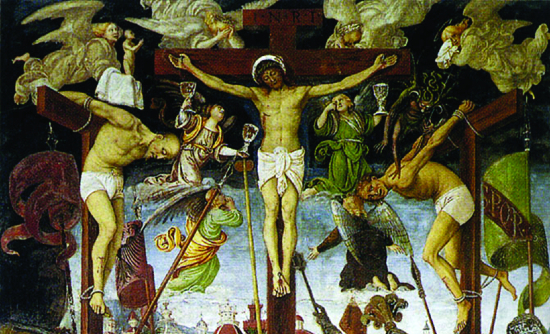
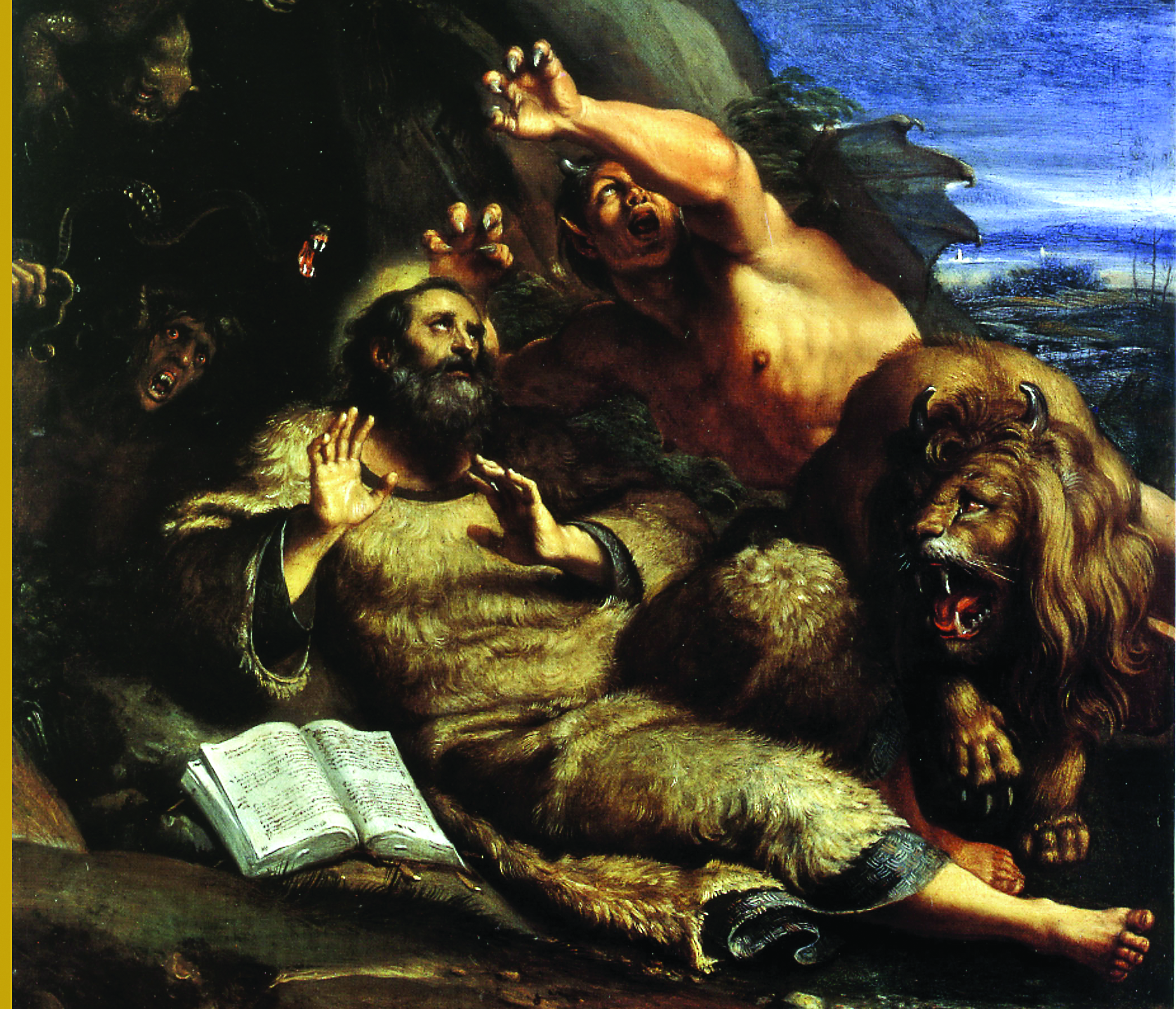
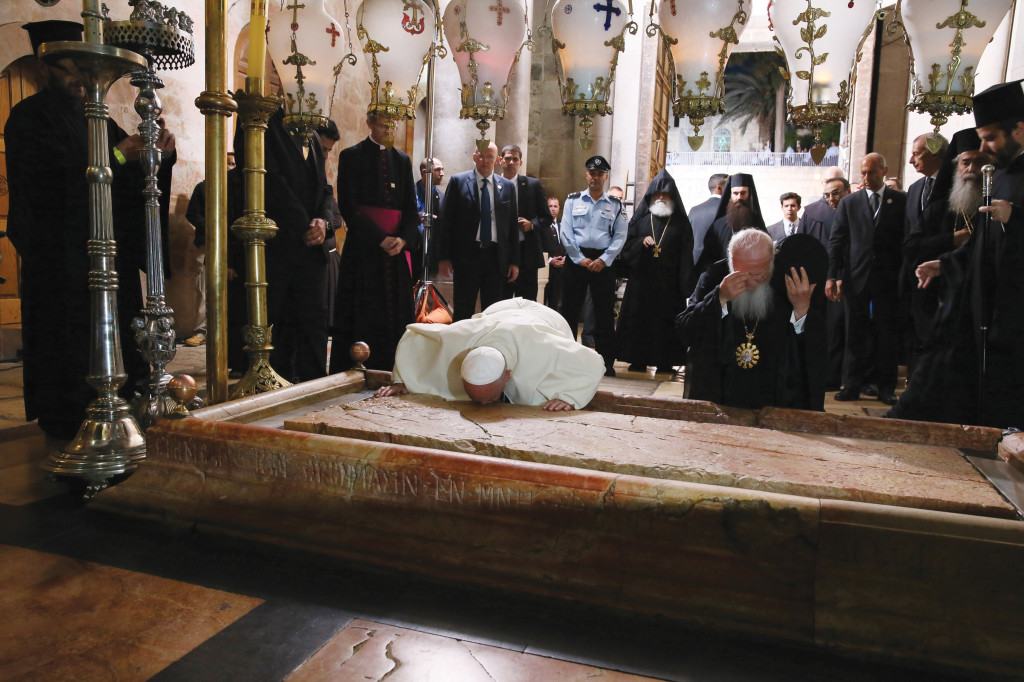
Facebook Comments